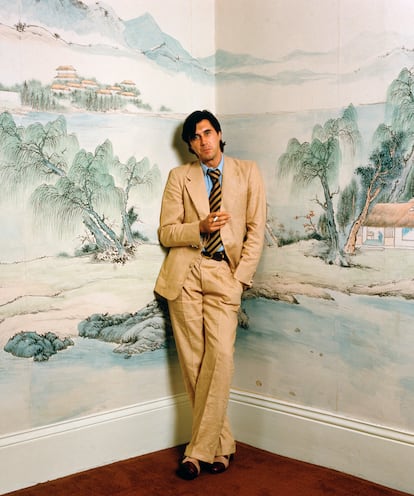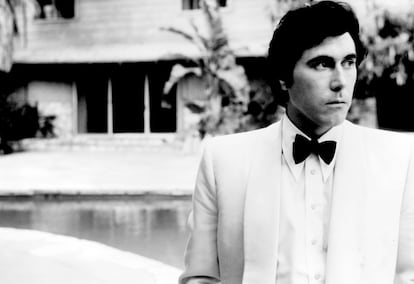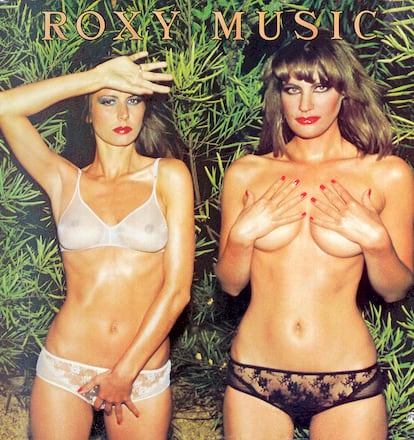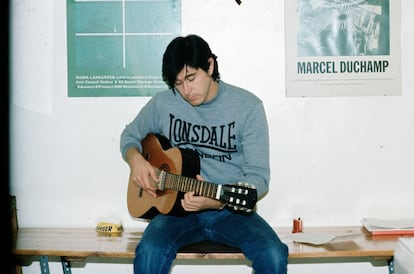Bryan Ferry, musician and dandy: ‘Rock and roll is not just jeans and T-shirts’
The English singer celebrates 50 years of making music with a retrospective of his career. ‘Roxy Music was a great band, with unique characters, so being part of it was a real pleasure,’ he tells EL PAÍS

Bryan Ferry doesn’t know how many blazers he keeps in his closet. “Too many,” he shrugs. More than 100? “I have no idea. You can only wear one at a time, so you don’t need that many.” He then looks down at the light blue shirt he’s wearing this afternoon, with the top two buttons undone… and no jacket. He laughs: “Today, I’m going casual.”
Ferry, 79, is well known for both the music he plays with his band — Roxy Music — and as a soloist. There’s a dogged elegance about him: he cultivates a distinctly dandy esthetic, sometimes donning a suit and tie, or even a tuxedo, which is what he wore on the cover of his 1974 album, Another Time, Another Place. In 2020, the British edition of GQ magazine defined him as “the master of menswear.”
“Clothes are fun,” he explains. “When I was young, while studying, I used to work on Saturdays in a tailor’s shop. That got me interested in knowing the different ways of designing a suit.” His gentlemanly look is timeless. “I like old Hollywood movies, with Humphrey Bogart, Cary Grant, Robert Mitchum… they were always well-dressed, they even wore hats. I miss that kind of thing.”
The English singer-songwriter sees music as an art form. In fact, he founded Roxy Music while studying Fine Arts at Newcastle University. Image has played a prominent role in his work. This is common to many other artists, but the difference is that Bryan Ferry has been proclaiming — for more than 50 years — that rock is compatible with class and refinement. “Rock and roll isn’t just jeans and T-shirts. If you look at people like Little Richard, he looked incredible. Otis Redding, Sam & Dave, Booker T. Jones… they went out to play in very elegant suits, with different colors. It was something that inspired me a lot at the beginning of my career,” he affirms, during his interview with El PAÍS via video call.

For one reason or another, Bryan Ferry — who was made a Commander of the Order of the British Empire in 2011 — is one of the most prominent figures in the history of rock music. However, his solo career is only partially popular with the general public. Less enlightened fans probably only recognize him from his 1985 album Boys & Girls, released after the overwhelming success of Avalon (1982), by Roxy Music, which includes memorable singles such as Slave to Love and Don’t Stop the Dance. Some even believe that he began his solo career in the 1980s. But that beginning actually dates back to 1973, when he released These Foolish Things. He has recorded 16 albums, leaving a vast catalog for posterity that spans 50 years. They’re now compiled in an anthology made up of 81 songs entitled Retrospective: Selected Recordings 1973-2023.
When Ferry made his solo debut, Roxy Music was still in its infancy: he had only released one album, a self-titled one. But his bandmates didn’t hold it against him. “I guess my first album was an experiment,” he explains. “They understood that I wanted to make a record that was different, a bit more fun. Paul Thomson [Roxy Music’s drummer] played on the whole album and [guitarist] Phil Manzanera played on at least one song. They understood that it was kind of a diversion. I still felt that my main job was the band, which I was writing for and which was the vehicle for my songs. It was a great band, very good, with unique characters, being part of it was a real pleasure.”
He remembers being a 28-year-old who went into a studio to record his first album as someone “full of ambition and excited to be able to record songs. I was a fan of music from a very young age and I’d never dreamed of expressing myself through it. It was exciting to find a way to do it and feel fulfilled. As an artist, you want to make an impression or expand your consciousness and, to a certain extent, offer a better version of yourself.”
What made These Foolish Things different was that it was a covers album. The repertoire included songs by Bob Dylan, Elvis Presley, The Beach Boys, The Rolling Stones, The Beatles and The Four Tops, among others. “I thought it would be interesting to try to record other people’s songs and develop my talents as an arranger, singer and producer,” Ferry explains. Since that release, covers albums have become increasingly important in Ferry’s discography, to the point that it can be said that, thanks to his efforts, he has laid the groundwork for other rock greats to do the same. In 2007, he recorded a full album of Bob Dylan compositions called Dylanesque.

He finds real joy in working with other people’s songs: “The best thing is that you don’t have the responsibility of the lyrics and the melody. There’s a great freedom in that. You say, ‘It’s a great song: let’s try something different, explore possibilities.’ I usually do it instinctively, when I feel it’s going to be interesting to me and to other people.”
Ferry took examples from jazz luminaries. “When I was a teenager, I listened to jazz records. I discovered that the same song was played by different musicians: Charlie Parker, Ella Fitzgerald, Billie Holiday, Frank Sinatra… there were different ways of doing the same standard. I like my songs, but it was fun to record ones that were different to my style of composition. The first solo album had a wide range of musical genres. The song These Foolish Things has very romantic lyrics. [The album of the same name] was a pop album, something very different from what I was doing with Roxy, which was more intense, dark and mysterious. It was a way to have fun for two weeks.”
He combined his work with Roxy Music with his personal projects until 1983, when — after the tour for the album Avalon — the band split up. But that record became Roxy Music’s best-selling album — two million copies sold worldwide, half of them in the United States alone — and also their epitaph. It was so strange that they threw in the towel at their peak that it is easy to imagine the executives of their record company at the time banging their fists on the table and shouting: “No! We want another album like that!”
“It was a perverse move,” Ferry admits. “It was a very English thing. Avalon worked very well. I recently went to Los Angeles, where Bob Clearmountain [the original sound engineer of the album] was remixing it with Dolby Atmos sound. I cried when I heard how beautiful it sounded. It struck a chord with many people and it continues to do so.”
“After Avalon, the next one was Boys and Girls,” he continues. “And even though it’s a solo album, it has a similar flavor, a similar sound. That’s why I like it a lot, too.”
Some argue that Roxy Music’s music is very sexy. Ferry doesn’t deny this: “There’s sexuality throughout the history of rock and roll. Little Richard, Elvis Presley, Fats Domino… they had a kind of sensuality. The music is abstract, it’s rhythmic and can be romantic. It takes people into another realm, which is quite nice.”
Not only is their music perceived as sexy, but also their album covers, which often feature scantily clad female models. The most obvious case is Country Life from 1974, whose cover features two models (Constanze Karoli and Eveline Grunwald), whom Ferry personally tracked down in Portugal. He invited them to visit the studio of photographer Eric Boman. One of them is shown wearing transparent white underwear (with one hand covering the underwear) and the other is topless, covering her breasts with both hands. That image was censored in the United States, Australia and Spain, where the decision was made to enlarge the image and present a close-up — cropped above the nipples — of the model on the left. One wonders how this cover would have been received today.

“Times have changed, that’s clear,” he replies. “I don’t know the numbers of how many people think one way or another. I always believed in freedom of expression and choice and of thought. It’s not fun when you see people afraid to talk about their tastes or what they don’t like. It’s difficult.” In any case, Ferry says that, in general, what he seeks is for the covers to reflect the sensitivity of the music behind them. “In the past, in vinyl shops, you saw the record displays and they were like street art. They weren’t in a museum, but within everyone’s reach,” he recalls.
From the office installed on the top floor of his London studio, sitting in front of a large bookcase, Bryan Ferry speaks slowly, politely and endearingly. It’s in this place where he spends most of the day, especially now that he’s preparing a new album. “Normally, I finish recording at 7 p.m. and then I like to go out to dinner,” he says. “I work with young people during the daytime. And, in the evenings, I see older people, usually designers, artists… I like to eat something and drink a bit, and I try to socialize, but only in small groups: no parties. On the weekends, I leave London and go to the countryside to breathe fresh air, look at the trees and listen to the birds. I’m totally serious.”
He admits that he doesn’t have many close friends in music. “I’ve worked with a lot of musicians, of course, but my closest friends are artists. I went to university with some of them. I like to continue friendships that go back a long way. I see musicians more at work. In London, it’s not so easy to get together with them. It’s a bit of a closed place in that sense,” he notes.

Ferry keeps his distance from the music that’s being made today. He says that, just yesterday, he spent some time listening to Neil Young’s Harvest (1972). “It’s really beautiful. I like those kinds of albums, with 40 full minutes of music,” he smiles. “I listen to a lot of classics, including classical music, which I put on the radio so I don’t have to choose a song. I read about new bands and, occasionally, I listen to new songs, but not much. If there’s something really good, people tell you about it.”
He concedes that “so much music has been made in the last 50 years that it’s hard for a group starting out to do something new.” Even so, he chooses The Last Dinner Party and Wet Leg — two girl bands — as being among his recent preferences. “There should be more women in the world of recording: engineers, producers… they have good musical instincts.”
The singer frequently visits Spain, for pure pleasure. One of his favorite cities is Seville. “I had an unforgettable time there,” he remembers. “It was Easter: there was a procession in the street. It stopped and, suddenly, someone from a balcony started singing a capella. It was just fantastic and moving. Even if you don’t understand the language or aren’t familiar with flamenco, you feel that great passion.”
EL PAÍS asks Ferry if he knows that, in Spain, there’s a music journalist and producer — Julián Ruiz — who dresses up like him, combs his hair like him and is more or less the same age as him? Has he ever met the guy?
The singer laughs: “I don’t remember. Maybe if I saw a photo… I’m sure he’s an improved version of me!”
Sign up for our weekly newsletter to get more English-language news coverage from EL PAÍS USA Edition
Tu suscripción se está usando en otro dispositivo
¿Quieres añadir otro usuario a tu suscripción?
Si continúas leyendo en este dispositivo, no se podrá leer en el otro.
FlechaTu suscripción se está usando en otro dispositivo y solo puedes acceder a EL PAÍS desde un dispositivo a la vez.
Si quieres compartir tu cuenta, cambia tu suscripción a la modalidad Premium, así podrás añadir otro usuario. Cada uno accederá con su propia cuenta de email, lo que os permitirá personalizar vuestra experiencia en EL PAÍS.
¿Tienes una suscripción de empresa? Accede aquí para contratar más cuentas.
En el caso de no saber quién está usando tu cuenta, te recomendamos cambiar tu contraseña aquí.
Si decides continuar compartiendo tu cuenta, este mensaje se mostrará en tu dispositivo y en el de la otra persona que está usando tu cuenta de forma indefinida, afectando a tu experiencia de lectura. Puedes consultar aquí los términos y condiciones de la suscripción digital.








































